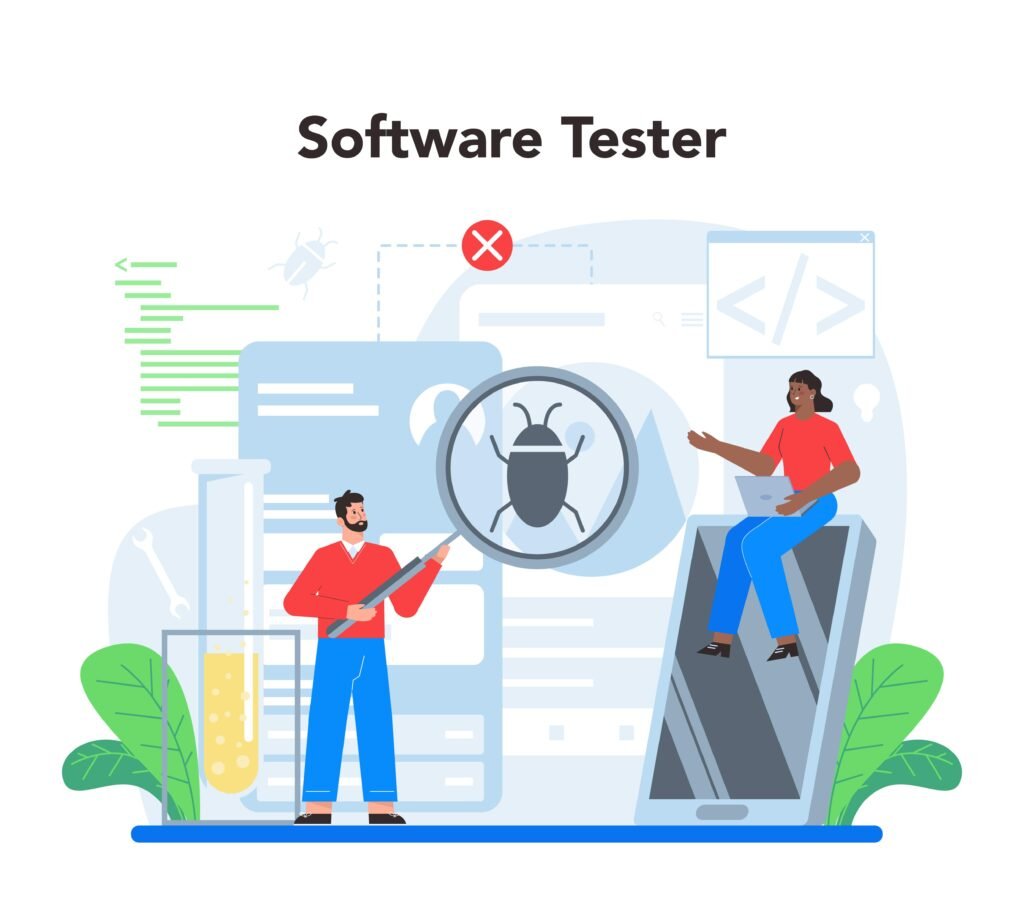
Have you ever wondered what it takes to become a successful software tester? Are you interested in pursuing a career in the field of software testing but don’t know where to start? When it comes to a career in software testing, certain skills and qualifications are necessary to succeed.
Yes, it is true that the demand for software testers is on the rise and will continue to increase in the next few years. Today, I am going to provide you with a step-by-step guide on how to become a software tester so that you can start your journey towards a successful career in software testing.
What is Software Testing?

In simple terms, software testing is the process of evaluating a computer system or program to determine if it meets its specified requirements and functions correctly.
Software testing helps identify any defects or errors in the system and ensures that it is functioning as expected. It is a crucial step in the software development process and is essential for delivering high-quality, reliable software to end-users.
There are various types and levels of software testing, including
- Unit testing
- Integration testing
- System testing
- Acceptance testing
- Regression testing
Each type of testing serves a specific purpose and helps to ensure the software’s overall functionality.
Why Become a Software Tester?
Becoming a software tester can be a fulfilling and rewarding career choice. As technology continues to advance, the need for skilled software testers also increases. Here are a few reasons why you may want to consider becoming a software tester:
- High Demand: As mentioned, the demand for software testers is on the rise as more and more companies rely on software to run their businesses. This means there are plenty of job opportunities for software testers, and it is a field that is expected to continue growing in the future.
- Constant Learning Opportunities: Software testing involves constantly learning new technologies, tools, and techniques. This keeps the job interesting and challenging, making it ideal for those who enjoy continuous learning. Additionally, as technology evolves and new software is developed, there will always be a need for software testers to ensure its quality.
- Collaborative Work Environment: Software testing often involves working in teams with other developers and stakeholders. This fosters collaboration and communication skills, which are highly valued in today’s workplace.
Career Growth Opportunities
With experience and expertise, software testers can progress to higher positions such as Test Lead, Test Manager, or Quality Assurance Director.
Attractive Salary Packages
In today’s competitive job market, software testers are in high demand and can command attractive salary packages. According to Glassdoor, the average salary for a Software Tester is $76,000 per year in the United States.
Diverse Industries
Software testing is not limited to just one industry. It is required in various sectors such as finance, healthcare, e-commerce, gaming, and more. This provides testers with the opportunity to work in different industries and gain diverse experiences.
Now you know well about the benefits of becoming a software tester. So, if you have an eye for detail and enjoy solving problems, a career in software testing might be the right choice for you.
How to Become a Software Tester

If you’re looking to become a successful software tester, here are some steps you can follow:
1. Gain Knowledge in Computer Science
If you’re looking to kick off a career in software testing, having a good understanding of computer science is a great place to start. This includes understanding programming languages, operating systems, databases, and other technical concepts.
You can gain this knowledge through formal education, such as a degree in computer science, or through online courses and self-study. This will not only help you understand the fundamentals of software testing, but also give you a solid foundation to build upon.
2. Familiarize Yourself with Different Testing Methodologies
In software testing, there are various approaches and techniques used to test a software product. It is important to familiarize yourself with these different methodologies to choose the right one for the project at hand. Some common testing methodologies include:
- Black-box testing: This method involves testing the software without any knowledge of its internal structure or code. It focuses on the functionality and user experience of the software.
- White-box testing: In contrast to black-box testing, this method involves examining the internal structure and code of the software.
- Grey-box testing: Yes. As the name suggests, this approach mixes aspects of both black-box and white-box testing. Testers have some knowledge of the internal structure of the software but not full access to its code. This allows for a more thorough and realistic testing process.
- Regression testing: This type of testing is used to ensure that changes or updates made to the software do not introduce new bugs or issues. It means running the same tests that were previously conducted to see if they still produce the same results.
3. Gain Practical Experience
After learning the concepts and techniques of software testing, it is also important to gain practical experience in this field. This can be achieved through internships, projects, or even volunteering for open-source projects.
I noticed that many companies offer internships for software testing, which can provide experience in a real-world environment. This will not only help you apply the knowledge you have acquired but also give you exposure to different tools and techniques used in the industry.
Similarly, working on projects related to software testing also enhances your skills and makes you stand out in the job market. You can work on your own personal project or collaborate with others to gain valuable experience.
4. Get Certified
Certification is a great way to demonstrate your skills and knowledge in software testing. Yes, experience is important, but having a recognized certification can give you an edge over other candidates. It shows that you have a deep understanding of the concepts and methodologies used in software testing. Some popular certifications include:
- ISTQB (International Software Testing Qualifications Board)
- CSTP (Certified Software Testing Professional)
- CTFL (Certified Tester Foundation Level)
To earn these certifications, you will need to pass a rigorous exam that tests your knowledge in various areas of software testing. These certifications are highly valued by employers and can open up new career opportunities for you.
5. Continuous Learning
Software testing is an ever-evolving field, with new techniques and technologies emerging constantly. As a software tester, it is important to continuously learn and stay updated on the latest developments in the industry. This not only helps you stay ahead of the competition but also allows you to improve your skills and become a more valuable asset to any organization.
There are various ways to continue learning as a software tester, such as:
- Online courses
- Industry events and conferences
- Blogs and forums
- Peer learning and mentorship programs
What Are Some Essential Skills for a Successful Software Tester?
While technical skills are crucial for any software tester but other important skills also contribute to their success. These include:
- Communication skills
- Time management
- Attention to detail
- Problem-solving abilities
- Adaptability and flexibility
- Teamwork and collaboration
- Analytical thinking
- Customer focus
It is important for software testers to continuously work on improving these skills in order to excel in their roles. By regularly seeking out opportunities for learning and growth, software testers can enhance their overall performance and contribute to the success of their team and organization.
Conclusion
As you can see, becoming a software tester requires a combination of technical skills, knowledge, and personal qualities. It is a challenging but rewarding profession that plays a crucial role in the software development process. But with the right mindset and dedication, anyone can become a successful software tester.
You can start by learning the fundamentals of software testing and practicing different testing techniques. It is also essential to continuously update your skills and stay updated with the latest tools and technologies in the industry.
Frequently Asked Questions
What qualifications are required to become a software tester?
You don’t necessarily need a specific degree to begin, but having a background in computer science, engineering, or IT is highly beneficial. Many successful testers also start with certifications like ISTQB or CSTE to validate their skills.
How can I gain experience in software testing?
You can start by building a portfolio through internships, freelancing, or participating in open-source projects. Practicing with testing tools and frameworks like Selenium or JMeter can also help you gain hands-on experience.
What is the typical timeline for becoming a software tester?
The time varies depending on your background and the effort you invest. With consistent learning and practice, you can gain the required skills within 6 months to a year. However, it’s important to continually update your knowledge and skills as the software industry is constantly evolving.